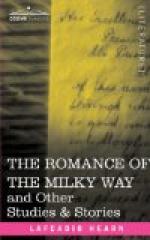[Footnote 24: Nubatama no yo might better be rendered by some such phrase as “the berry-black night,”—but the intended effect would be thus lost in translation. Nubatama-no (a “pillow-word”) is written with characters signifying “like the black fruits of Karasu-[=O]gi;” and the ancient phrase “nubatama no yo” therefore may be said to have the same meaning as our expressions “jet-black night,” or “pitch-dark night.”]
Watashi-mori,
Fun[’e] haya watas[’e];—
Hito-tos[’e] ni
Futatabi kay[=o]
Kimi naranaku ni!
[Oh, ferryman, make speed
across the stream!—my lord is not
one who can come and go twice
in a year!]
Aki kaz[’e] no
Fukinishi hi yori,
Amanogawa
Kawas[’e] ni d[’e]dachi;—
Matsu to tsug[’e] koso!
[On the very day that the
autumn-wind began to blow, I set
out for the shallows of the
River of Heaven;—I pray you, tell
my lord that I am waiting
here still!]
Tanabata no
Funanori surashi,—
Maso-kagami,
Kiyoki tsuki-yo ni
Kumo tachi-wataru.
[Methinks Tanabata must
be coming in her boat; for a cloud is
even now passing across the
clear face of the moon.[25]]
[Footnote 25: Composed by the famous poet [=O]tomo no Sukun[’e] Yakamochi, while gazing at the Milky Way, on the seventh night of the seventh month of the tenth year of Tampy[=o] (A.D. 738). The pillow-word in the third line (maso-kagami) is untranslatable.]
—And yet it has been gravely asserted that the old Japanese poets could find no beauty in starry skies!...
Perhaps the legend of Tanabata, as it was understood by those old poets, can make but a faint appeal to Western minds. Nevertheless, in the silence of transparent nights, before the rising of the moon, the charm of the ancient tale sometimes descends upon me, out of the scintillant sky,—to make me forget the monstrous facts of science, and the stupendous horror of Space. Then I no longer behold the Milky Way as that awful Ring of the Cosmos, whose hundred million suns are powerless to lighten the Abyss, but as the very Amanogawa itself,—the River Celestial. I see the thrill of its shining stream, and the mists that hover along its verge, and the water-grasses that bend in the winds of autumn. White Orihim[’e] I see at her starry loom, and the Ox that grazes on the farther shore;—and I know that the falling dew is the spray from the Herdsman’s oar. And the heaven seems very near and warm and human; and the silence about me is filled with the dream of a love unchanging, immortal,—forever yearning and forever young, and forever left unsatisfied by the paternal wisdom of the gods.




